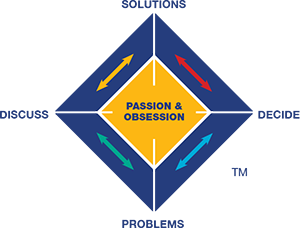Passion and Obsession
-
-

When successful people perform well, for example in business, sport, art and other areas, they usually talk about their passion for what they do. A top golfer during an interview said, “I would play the game even if there was no big money at stake, because I love it.” Once people find something they enjoy doing, they usually do more of it. As a result, their performance usually improves. This is particularly so if they combine it with an element of obsession. That means they develop a pattern of performance and repeat it until they achieve higher standards.
In some cases, this becomes what is called, ‘compulsive obsessive behaviour’. However, it can have negative consequences if one repeats behaviour that does not solve problems, but just becomes a routine and ritual. Passion for your chosen area of effort, combined with a well-organized obsessive attention to practice, can lead to significant improvements. That is what top coaches provide elite athletes and the same effect can be gained in business, science, engineering, medicine, music and other area with focused passion and organized obsession.
-
Luciano Pavarotti

There are many people who have brought passion and a degree of obsession to their work. One of them was a great singer named Luciano Pavarotti. In 1955, as a teenager, he went with his father from Italy to a small village, called Llangollen, in the north of Wales. They were part of a choir from Italy. It was a long and tiring journey, as there were no motorways in those days. The Italian choir won the competition. On the way home, Pavarotti aged 19, told his father that he wanted to be a professional singer. Forty years later, in the same village, he returned as an international star of opera and with brilliance, he sang Nessum Dorma. In the intervening years, Pavarotti had devoted himself with both passion and obsession to achieving his ambition. It is those two factors that need to accompany basic talent, knowledge and intelligence. You will learn more from this audio recording.
-
Applications
Look at the work you are doing. Does it excite you or bore you? How can you organize to spend more time doing the things that you enjoy? It may take time and experience in various roles to discover the work for which you have a passion.
One executive in the banking business decided his passion was to help the poor. So, he moved to a role where he could use his professional financial skills with a different purpose and objective. Once he did that he realized he was more committed and also obsessive in order to succeed, not just for himself but for others. In effect, he combined passion with obsession and also gained more personal satisfaction. What do you need to do in order to achieve such an outcome?
-